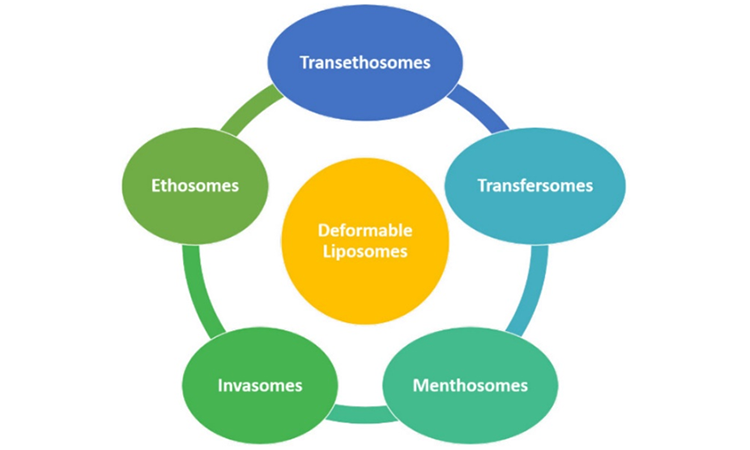Deformable Liposome Services
The intact skin is an excellent protective wall for the body and an impenetrable barrier for most drugs. To improve the percutaneous absorption of drugs, it is necessary to improve the permeability of the skin to the drugs by other means.
Liposomes are closed vesicle-like structures formed by phospholipid bilayers, and liposomes have great value as carriers of drugs. Deformable liposomes (DL) are phospholipid-based vesicular drug delivery systems. Because of their deformable properties, overcome the problems of conventional liposomes and therefore help to improve the delivery of therapeutic agents through intact skin membranes.
 Figure 1. Schematic representation of different deformable Liposomes. (Nayak, D., et, al., 2021)
Figure 1. Schematic representation of different deformable Liposomes. (Nayak, D., et, al., 2021)
- Transfersomes
Transfersomes are a vesicle carrier system with at least one internal aqueous compartment surrounded by a lipid bilayer, and an edge activator. This structure results in a unique drug carrier system that can deliver therapeutic agents with a wide range of solubilities and the ability to self-optimize and self-regulate.
Transfersomes are inherently flexible and able to pass through very narrow skin barriers for topical and systemic drug transport. It can increase transdermal flux and improve the site-specificity of bioactive agents. It minimizes the adverse side effects of drugs and protects them from metabolic degradation and has good biocompatibility and biodegradability. It is an obvious choice for achieving sustained drug release as well as a predictable and extended duration of activity.
- Ethosomes
Ethosomes are phospholipid-based elastic nanovesicles (containing a high percentage of ethanol) that are non-invasive delivery vehicles. It is more effective in delivering substances deeper into the skin than conventional liposomes.
Ethosomes have proven to be an effective permeation enhancer and carrier system for the trans-cellular delivery of various therapeutic agents. Ethosomes can capture hydrophilic, lipophilic, and amphiphilic drug molecules with various physicochemical properties. They are simple to prepare, safe and effective, and designed to enhance the delivery of active agents.
- Transethosomes
Transethosomes are a combination of transferosomes and ethosomes. Transethosomes can be delivered by both topical and systemic routes. Drugs from low to high molecular weight can be easily encapsulated by this system. The bioactive agent is protected due to encapsulation and therefore it releases its contents in a very slow and gradual manner.
The biodegradable and biocompatible nature of transethosomes allows them to show efficient retention capacity. Moreover, the preparation of transethosomes does not require any excessive drug additives and does not involve cumbersome processes.
- Invasomes
Invasomes are novel and flexible vesicles containing a mixture of soy phosphatidylcholine (PC), terpenes, lyso-PC, and ethanol. Ethanol increases the mobility of the lipids in the vesicle structure, creating a softer structure that is less stiff than traditional liposomes, thus enhancing their permeability to the skin. Similarly, terpenes also have been shown to improve permeability by disrupting the tight structure of stratum corneum lipids.
Invasomes have been used for transdermal delivery and this non-toxic vesicle carrier can also aid in the penetration of lipophilic and hydrophilic drugs, thus invasomes have great potential for topical therapeutic applications.
- Menthosomes
Menthosomes are novel ultra-deformable carriers for enhanced transdermal delivery, consisting of menthol, phospholipids, and edge activators containing cationic surfactants. L-menthol provides enhanced skin permeability and facilitates transdermal delivery of various drugs by increasing drug distribution and diffusion. Menthol and cationic surfactants increase mobility and enhance transdermal drug delivery by affecting the laminar lipid bilayer structure. It has been reported that menthosomes have the potential to be used as transdermal drug delivery vehicles for meloxicam.
You can always get in touch with us to learn more about deformable liposome services, including transfersomes, ethosomes, transethosomes, invasomes, and menthosomes.
Ordering Process
Reference
- Nayak D, Tippavajhala V K. A comprehensive review on preparation, evaluation and applications of deformable liposomes. Iranian Journal of Pharmaceutical Research: IJPR. 2021, 20(1): 186-205.

